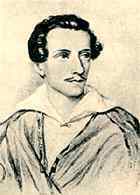
Tragedia podbitego narodu Wenedów przedstawiona jest w utworze w stylistyce bliskiej mitologii celtyckiej, osjanizmowi i mitologii nordyckiej. W celu zdemaskowania postaw upadłych moralnie bohaterów utworu, instytucji i grup społecznych, poeta posłużył się elementami groteski (pomimo wierności zasadom budowania tragedii). Słowacki w tym dziele nawiązał do propagowanej wtedy przez historyków teorii podboju, która wyjaśniała źródła struktury narodu polskiego i dwoistość jego istoty. Powstał po upadku powstania 1830, z tej perspektywy poeta nadaje dodatkowe znaczenie ówczesnej sytuacji Polaków i ukazuje sens dziejów narodowych. Klęski dopatruje się w braku bohaterstwa, fatalizmie dziejowym, dwoistości ideowej narodu i jego oczekiwaniu na niezwykłe przemiany. Nadzieję poeta widzi jedynie w heroicznej ofierze. [wikipedia]
Author

Juliusz Słowacki ['juljuʂ swɔ'vatski] (4 September 1809 in Kremenets, Volhynia, Russian Empire now in Ukraine – 3 April 1849 in Paris) was a noted Polish Romantic poet, considered to be one of the "Three Bards" of Polish literature. His works often feature elements of Slavic pagan traditions, mysticism, and Orientalism. Life and work Influenced largely by Byron and Shakespeare, Słowacki's early work was often historical in nature, combining exotic locales (as in Arab) and tragedy (as in Maria Stuart). His work took on a more nationalist tone following the failed November Insurrection of 1830 - 1831. Like many of his countrymen, he decided to emigrate to France as a political refugee. Ironically, the first collections of poems he produced in France were unpopular in his native Poland, as they failed to capture the sentiment of the people living under Russian occupation. It was the French authorities which deemed them too nationalist; following a trip to Geneva in 1832, he was denied the right to return to France as part of a larger program to rid the country of the potentially subversive Polish exiles who had settled there. A third volume of his works, produced in Geneva, was far more nationalist in tone, and he began to win recognition in his homeland. In 1836, Słowacki embarked on a journey throughout Italy, Greece, Egypt and Palestine, which he described in his epic poem "Podróż do Ziemi Świętej z Neapolu". In 1844, he wrote Genezis z Ducha, an exposition of his philosophical ideas (called genesic idea) according to which the material world is an expression of an ever-improving spirit capable of progression into constantly newer forms. It was at this time that he attached himself to a group of likeminded young exiles, determined to return to Poland and win its independence. One of his friends was the pianist and composer Frédéric Chopin. The group travelled to Poznań, then under Prussian control. He participated in the Wielkopolska Uprising of 1848, addressing the National Assembly (Komitet Narodowy w Poznaniu) on 27 April. "I tell you," he declared as the rebels faced military confrontation with the Prussian Army, "that the new age has dawned, the age of holy anarchy." By 9 May, the revolt was crushed. Arrested by the Prussian police, Słowacki was sent back to Paris. On his way there, he passed through Wrocław, where he was reunited with his mother, whom he had not seen for almost twenty years. He died in Paris the following year, and was buried in the Montmartre. In 1927, some eight years after Poland regained her independence, the Polish government requested that Słowacki's remains be moved to Wawel castle in Krakow. He was reinterred near his old rival, Adam Mickiewicz. Long after his death, Słowacki acquired the reputation of national prophet. His poem "Papież Słowiański" (The Slavic Pope), published in 1848, was believed to foretell the ascension, in 1978, of Karol Wojtyła to the throne of St. Peter as Pope John Paul II. In 2009 Faye Dunaway starred in film "The Bait" by Polish film director and producer Dariusz Zawislak. "The Bait" is a contemporary version of the drama, "Balladyna."